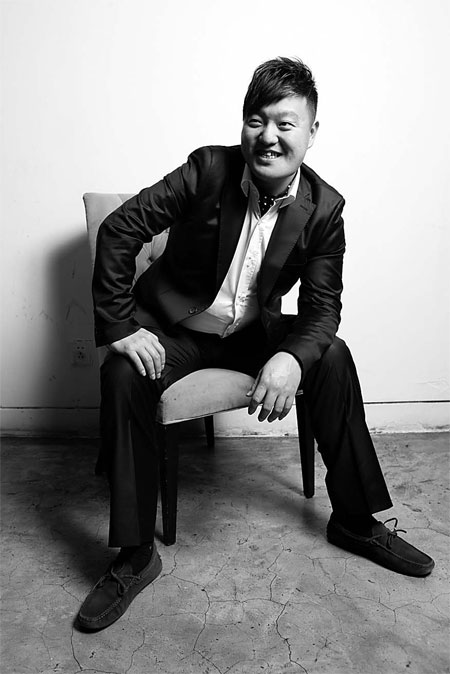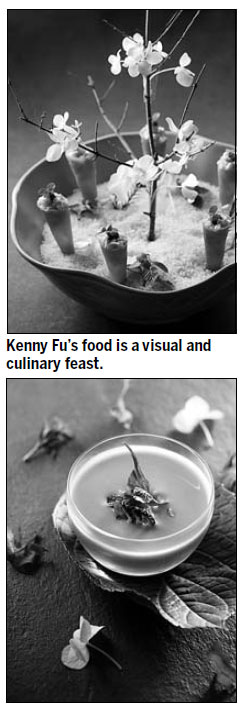Tradition with fashion


Kenny Fu started his culinary training as a Western chef, and then got exposed to classical Chinese elements in a fusion restaurant. He has now gone full circle.
At 33, Kenny Fu is already managing his own restaurant, Le Quai, and he compares the creation of the menu as a game of building blocks.
"I'm matching up Chinese elements, and putting in seasonal dishes, and extracting the best from the eight major Chinese cuisines, especially those that are seasonal," the chef explains.
But let's rewind. Fu started his career trained in Western cuisine, but after he shifted to studying Chinese cuisine, he realizes he has yet to plumb its depths.
In 1997, the 18-year-old Fu graduated from Jinsong Vocational School in Dongcheng district, majoring in Western cooking. His ambition then was simply to become an executive chef.
His first five years working at the Harbor Plaza Hotel in Beijing was so outstanding he earned the chance to work in the chain's Hong Kong hotel for a year in 2000 - home to an Italian restaurant with a two-star Michelin chef.
"Michelin-starred chefs were rare in Beijing at the time, and when I returned, I realized how weak we were in Western cuisine," he says.
By 2003, Fu had already risen to the position of chef de parti at the Harbor Plaza. But then, the hotel changed hands and everybody lost their jobs.
Fu was appointed executive chef at Green T. House, the iconic restaurant started in 1997 by Beijing artist/musician/chef JinR, who had broken the mold in fusing culinary culture with aesthetic presentations, giving the diner a holistic experience the moment he crosses the threshold.
Fu was stunned when he first entered Green T. House and saw the pure white ambience, with the waitresses also in pure white.
After six months. Fu followed JinR to Singapore to show off their creative cuisine to the Tung Lok Group, which ultimately resulted in the creation of their Humble House restaurants.
Fu credits the 18 months he worked at Green T. House with sharpening his culinary skills and exposing him to the concept of creative cuisine.
"The chef is also a designer. He tries to be most creative within the confines of a small kitchen. That's what makes him stand out," he says.
At just 24, Fu was already catering at events for Louis Vuitton.
"Newly opened restaurants were trying to poach me," he recalls. "So I became complacent. But it was actually JinR who was truly outstanding. I looked good because I carried out her ideas."
After he floated around for a bit, the Tung Lok group invited him to Singapore to work as executive chef at its Jade Restaurant in the heritage Fullerton Hotel, alongside celebrity chef Sam Leong.
Later, he came back to Beijing to work in Tung Lok's Humble House, and then at the Whampoa Club. He joined Le Quai in 2007.
Fu has been more than just an executive chef. In his five years here, Fu says he came to understand not just how to manage the kitchen, but also the front end of the business.
"In the kitchen, you face just chefs. But to manage a restaurant, you deal with everyone from public security to sanitation officers to the media. I had no such experience before. And I had to make sure my customers are satisfied."
At the same time he also made up for what he lacked in Chinese cuisine by becoming a formal disciple of Dong Zhenxiang, founder of Da Dong Restaurant.
"I'm getting acquainted with new ingredients. You have to stay in the forefront to exploit the opportunities the market delivers."
He plays with presentation.
French oysters are served on top of a ball of ice, orange salmon sashimi hand-rolls are set on a base of rock salt, planted with a plum blossom branch.
And on his menu, diners find a spectrum that includes braised ox tail in Bordeaux sauce, gongbao chicken garnished with lychee, and Taiwan-style three-cup chicken.
"In an ever changing society, tradition without fashion will fall out in the market.
"But if you try to get creative without the tradition, the restaurant will also die. One has to keep a good balance," says Fu.
In other words, tradition is the foundation of his cuisine, while creativity gives it new life.























